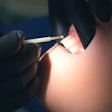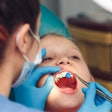Researchers at Boston University School of Medicine (BUSM) have found that pediatricians provided with the proper communication, educational, and information technology tools and training could significantly reduce the rates of children developing early childhood caries, according to a study in Medical Care (September 23, 2009).
Lead author Nancy Kressin, Ph.D., an associate professor of general internal medicine at BUSM, and colleagues implemented a multifaceted practice-based intervention in a pediatric outpatient clinic treating 635 children vulnerable to early childhood caries and compared the results to those of 452 children from a similar nearby clinic providing standard care.
The researchers provided the pediatric clinicians with communication skills training to help them more effectively counsel parents and caregivers about the risk of early childhood caries. Pediatricians and clinical nurses participated in a one-hour study training session and were provided with educational brochures to give to parents. The electronic medical record was also adapted to prompt clinicians to remember to counsel.
After the educational program, a simultaneous recruitment of children affected with early childhood caries was conducted at a comparison site where the clinicians did not receive training.
Parents and caregivers of children ages 6 months to 5 years were asked to participate in a clinical exam and interview that consisted of a series of questions inquiring about the parent's or caregiver's discussion with the child's doctor or nurse. This interview assessed the degree the clinician covered the topics on which they had been trained to counsel regarding early childhood caries risk reduction. This process was repeated approximately one year later.
The researchers found that provider knowledge about early childhood caries increased after the intervention training (the number of correct answers improved from 66% to 79%), and that providers at the intervention site used more counseling strategies, which persisted after adjusting for sociodemographic characteristics. In addition, children at the intervention site had a 77% reduction in risk of developing early childhood caries at follow-up, after controlling for age and race/ethnicity, sociodemographics, and caries risk factors (p ≤ 0.004).
"We developed and implemented a multifaceted, pediatric practice-based intervention where children especially vulnerable to early childhood caries received enhanced care to prevent this disease from occurring or reoccurring, and it had marked effects on reducing children's rates of developing early caries," Kressin said in a press release.
The study was funded by the National Institutes of Health's National Institute of Dental and Craniofacial Research.
Copyright © 2009 DrBicuspid.com



















